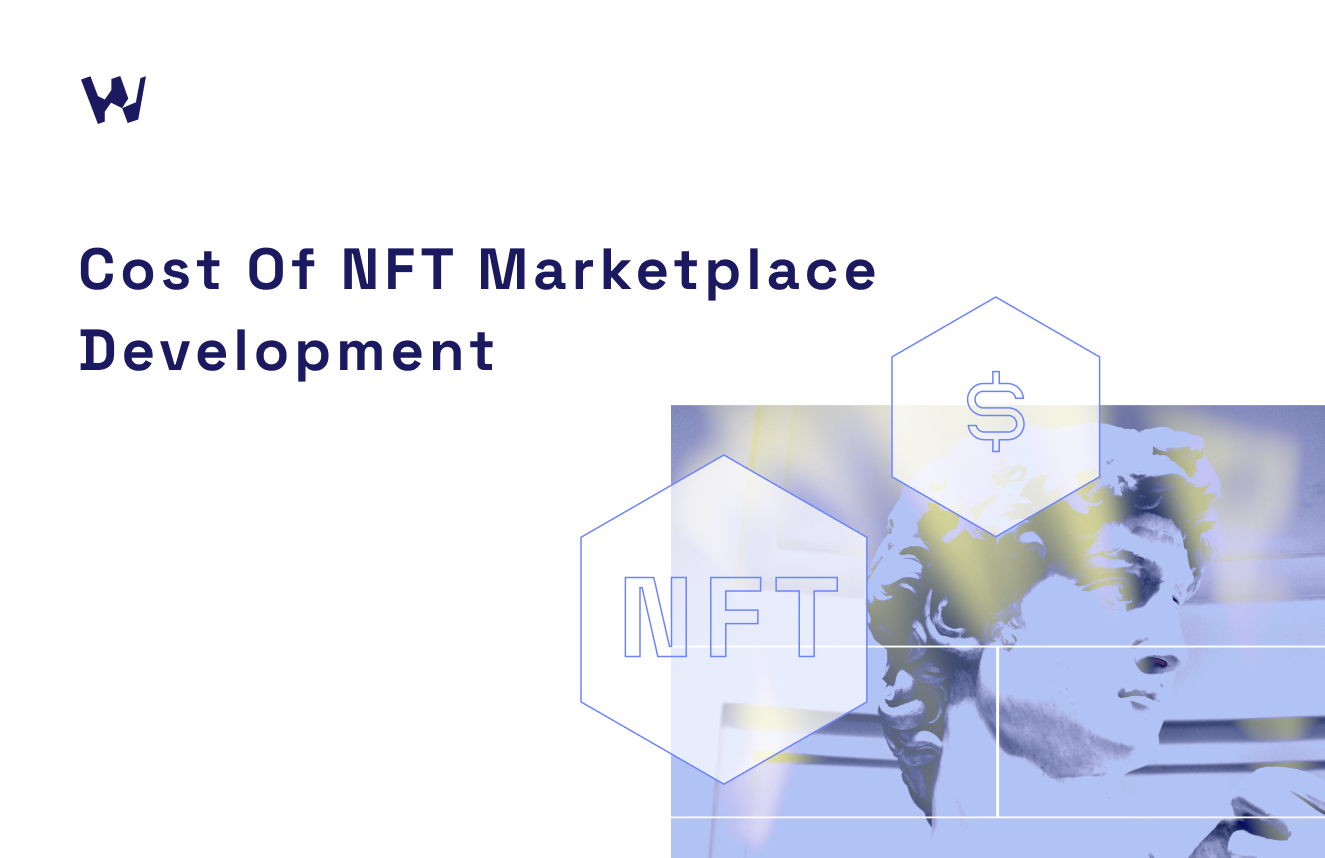Breaking down the cost of NFT marketplace development

In the ever-evolving digital landscape, non-fungible tokens, commonly known as NFTs, have taken the art and collectible world by storm. The burgeoning interest in these unique digital assets has led to a surge in the number of NFT marketplaces where enthusiasts can buy, sell, and trade their prized possessions.
The Verge: “NFTs exploded in popularity, the situation has only gotten more complicated. Pictures of apes have sold for tens of millions of dollars, there’s been an endless supply of headlines about million-dollar hacks of NFT projects, and corporate cash grabs have only gotten worse.”
NFTs may not be the top topic to discuss today, but it’s still popular among investors, artists, entrepreneurs, collectors, and rich individuals. And the number of monthly visitors to OpenSea is still around 11-15 million.
So, for those looking to dive into the NFT market development, understanding the costs involved is paramount.
What's the buzz with the NFT art marketplace?
Before we break down the costs, it's essential to understand the NFT marketplace value.
Unlike traditional art platforms, an NFT art marketplace provides a decentralized venue where creators can put up their digital artworks without the need for intermediaries.
Given that the artworks are stored on the blockchain, authenticity and ownership are easily verifiable, adding to the allure of these platforms.
The cost of setting up an NFT exchange
Many entrepreneurs ask, "How much does the NFTs marketplace cost to make?" The answer isn't straightforward. The cost of setting up an NFT exchange can vary based on several factors:
Blockchain integration: Integrating with a blockchain marketplace isn't cheap. Depending on the blockchain you go with, costs can vary.
Maintenance and updates: After rolling out the platform, regular maintenance and updates will be essential to stay on the verge of NFT innovations.
Security measures: Given the high value of assets on the NFT exchange, robust security measures are non-negotiable.
Marketing and branding: To stand out from the crowd and attract artists and collectors, effective branding and marketing strategies are a must.
NFT marketplace development: stages and expenses
Developing an NFT marketplace is no small feat. It requires meticulous planning, a deep understanding of the technology, and a significant financial commitment. Here's an expanded breakdown of the development stages and the corresponding expenses:
Planning and research: The foundational stage.
Activities: Market research, competitor analysis, identifying target audience, determining feature set, and choosing the right blockchain.
Duration: 1-3 weeks.
Cost: $1,000 to $5,000.
Design and prototyping: Bringing your idea to a tangible form.
Activities: Creating wireframes, designing user interface (UI), user experience (UX) strategies, and developing a clickable prototype.
Duration: 2-5 weeks.
Cost: $2,000 to $15,000.
Check our design for Enefty: NFT marketplace, which was made after the project moved from MVP to a full-fledged platform.
Development and integration: The heart of the project.
Activities: Backend development, blockchain integration, setting up servers and databases, implementing security protocols, and integrating other necessary features such as payment gateways.
Duration: 3-6 months.
Cost: $30,000 to $150,000 depending on complexity.
Testing and quality assurance (QA): Ensuring your platform is ready for the public.
Activities: Functional testing, usability testing, performance testing, security audits, and bug fixing.
Duration: 2-4 weeks.
Cost: $5,000 to $20,000.
Deployment and scaling: Launching your platform and ensuring it can handle growth.
Activities: Setting up hosting, deploying the platform to live servers, ensuring scalability options for future growth, and setting up monitoring tools.
Duration: 1-2 weeks.
Cost: $5,000 to $15,000.
Launch and marketing: Making a grand entrance into the NFT world.
Activities: Pre-launch marketing campaigns, social media promotion, partnerships with NFT artists or creators, PR campaigns, and post-launch user acquisition strategies.
Duration: Ongoing, but intensive for the first 2-3 months.
Cost: $7,000 to $50,000 for a comprehensive launch strategy.
Feedback and iteration: Continual refinement post-launch.
Activities: Gathering user feedback, making necessary adjustments, introducing new features based on demand, and optimizing platform performance.
Duration: Ongoing.
Cost: Varies, but setting aside $5,000 to $30,000 initially can be wise.
Maintenance and support: Keeping the platform up and running smoothly.
Activities: Regular updates, server maintenance, bug fixes, customer support, and addressing any unforeseen issues.
Duration: Ongoing.
Cost: Around 10-20% of the initial development cost annually.
To sum up, the approximate cost of NFT marketplace development is between $100,000 and $500,000.
Factors that affect the costs of building an NFT marketplace
Scope and complexity: Like any other project, the broader and more intricate your NFT marketplace vision, the more you'll have to shell out. If you're aiming for a full-fledged platform like OpenSea or a specialized NFT art marketplace, expect the costs to shoot up.
Technology stack: The choice of blockchain technology and backend tools can significantly influence the non-fungible tokens cost. Ethereum is a common choice, but there are other alternatives like Binance Smart Chain and Flow.
Design and user experience: Don't cut corners here. Investing in a top-notch design ensures that your marketplace stands out in the crowded NFT market development space.
Region and developer rates: Depending on where you hire your developers, rates can vary. Developers in North America might charge more than those in Eastern Europe or Asia.
Bottom line
Building an NFT marketplace is a substantial commitment both in terms of time and finances. By understanding the depth of each development stage and its associated costs, entrepreneurs can set realistic expectations and budget effectively, ensuring a smoother path to launching a successful marketplace.
Reach out to us today to pioneer the next leading NFT marketplace.